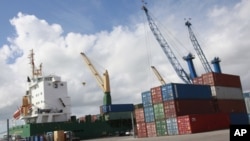A new study indicates trafficking in drugs and weapons is flourishing on the world's oceans with relatively little control, and that much of the illegal material is shipped by companies based in developed nations.
The report released Monday by the Stockholm International Peace Research Institute is the first in-depth study of maritime drugs and arms trafficking. Shipped in sealed containers, the merchandise includes cocaine transported to the United States and weapons that have fueled violence in the Democratic Republic of Congo and the government crackdown in Syria.
Hugh Griffiths, who co-authored the report for the Sweden-based institute, says the findings raise major security concerns.
"If there were enough smart terrorists out there, this is the method they could use," he says. "Because in most cases, you have to believe that what is in the container is what it says on the documents accompanying that container."
Strikingly, the study finds the majority of the shipping companies are based in Western nations like Germany, Greece and the United States. But, Griffiths says, in many cases the ships have tangled origins. Many sail under so-called "flags of convenience" from nations with little or no oversight.
"Sometimes the weapons were seized aboard German-owned, French-operated, Liberian-flagged vessels," he says. "They were transporting Arabian-origin arms to places like Nigeria. The ships weren't aware of what they were transporting."
Illegal arms shipments to Africa are a big concern, but, Griffiths says, ships and captains transporting the goods often have checkered pasts along with poor safety and pollution records.
"Our report documents... for the first time a correlation between unsafe ships and those where the owners, operators or captains were complicit in the trafficking," he says, explaining that such basic regulatory infractions may be one clue to prompt inspections of suspect ships docked in a given port. "There's a very high correlation."
A case in point, he adds, is a Russian-operated ship called The Chariot, which is reported to have delivered ammunition to Syria this month despite being temporarily halted in Cyprus.
"This ship was already on our radar because we'd been passed documents in 2011 showing this same ship had transported more than four-million rounds of small ammunitions from the Egyptian military to the Democratic Republic of Congo," he says.
The Stockholm institute is calling for greater international cooperation in tracking and cracking down on illicit maritime trade. Griffiths says authorities can also re-purpose existing methods -- such as ways to reduce coastal pollution -- to help curb the illicit trafficking.
Study: Drugs, Arms Flow Virtually Unchecked on World's Oceans
- By Lisa Bryant




